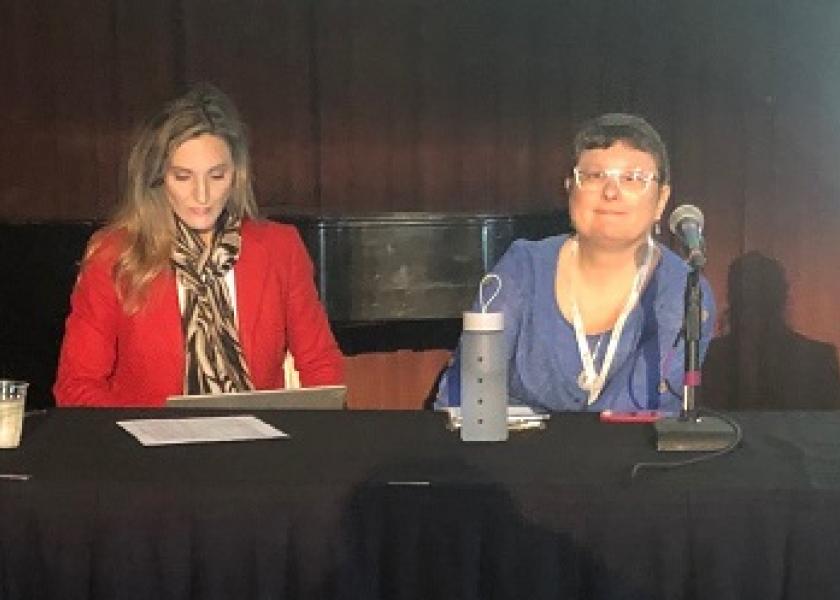Public and private efforts both needed to fight fraud

PACIFIC GROVE, Calif. — Government and private sector efforts are both needed to prevent organic fraud, speakers at the 40th annual EcoFarm Conference said.
A Jan. 23 panel featured Laura Batcha, executive director of the Organic Trade Association; Jennifer Tucker, deputy administrator of the U.S. Department of Agriculture’s National Organic Program; and Natalie Kraut, director of the Division of Inspection Services for the California Department of Food and Agriculture.
Tucker said pending USDA regulations will strengthen fraud prevention. In particular, she said a proposed rule, expected to be available for a 60-day public comment period by the end of March, allows fewer organic handlers to be exempt from certification. In addition, import oversight will be improved through electronic import certificates.
Customs and Border Protection will be launching a pilot program for the certificates in April, she said.
Finally, she said the regulations will authorize unannounced inspections and put in place minimum training requirements for inspectors.
She said the USDA often gets questions about whether a particular company is certified, so the agency has increased outreach to the organic community about the Organic Integrity Database, which lists all certified organic operations.
More awareness of the database will allow the USDA to spend more time on complaints, leading to more efficient investigations of possible fraud.
Tucker encouraged attendees to speak up if they have concerns about fraud, but evidence is needed to begin an investigation.
“So if we often will get a comment, ‘Well, (the organic commodity) is really cheap and if it’s really cheap, there must be something wrong,’” she said. “That is unfortunately is not evidence; we need a solid foundation of (evidence) in order to begin an investigation.”
Grain and oilseed fraud has been a recent area of focus, and Tucker said more than 275 operations in the Black Sea region have lost organic certification because of USDA investigations. Organic suppliers in Argentina have also lost certifications, she said.
Import oversight includes yield analysis of organic commodities in some countries.
“We are going to places that don’t even necessarily have to have a complaint,” she said. “If we see growth there, we’re going and doing surveillance because we want to stop the problems before they begin.”
Tucker said high-profile criminal fraud cases have been in the U.S. as well, and those cases serve as a deterrence to fraud.
“The faster we can get (fraudulent operators) out of the system, whether it’s through surrender or suspension, that is our priority,” she said.
In response to a question from the audience, Tucker said the pending proposed rule on organic enforcement doesn’t specifically mention blockchain technology for organics but does allow for it.
“We were trying to be very careful in writing the rule not to specify a specific technology, but rather to specify a set of principles and potential approaches,” she said.
Batcha said the OTA is hoping that the proposed rule will require operators report organic acreage to the Organic Integrity Database.
“Recording (acreage) into that database is a key focus area for us,” she said.
The CDFA’s Kraut said California officials conducted 1,700 inspections last year, up 21% from year-ago levels. Through separate programs, the state also collected and tested 385 samples for pesticide residues and collected 35 samples in a pilot project screening organic commodities for the presence of genetically modified organisms.
Private industry efforts
The Organic Trade Association has a program to target fraud, Organic Fraud Prevention Solutions.
Batcha said the voluntary program is designed for business-to-business assurance of organic compliance.
“We don’t have to wait for government to do anything to make this program work,” she said. “It’s an internal quality control program. It’s not a certification, verification or labeling program.”
She said the program involves strengthening internal systems in private businesses, including performing vulnerability assessments and developing mitigation measures.
“What are your vulnerable commodities? Where are they coming from? Where are you seeing price surges?” she said.
The cost of the program, according to the OTA website, varies depending on company size. For most OTA members, who receive a discount, the costs would be $320 to $1,280.
Initial training on vulnerability assessments, expected to begin in March, will be free for any organic business.
Related articles
EcoFarm panel looks at supply chain challenges
Session looks at shifting organic marketing channels







